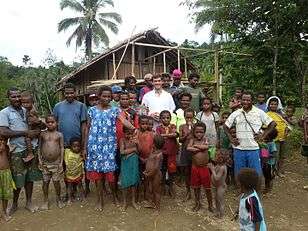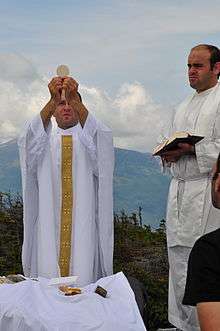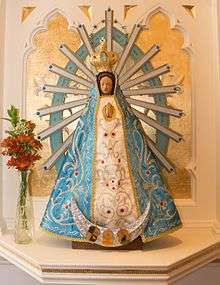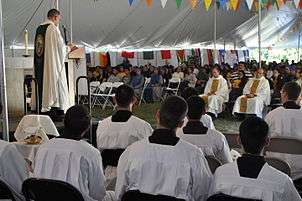Institute of the Incarnate Word
 | |
| Abbreviation | IVE |
|---|---|
| Motto | Verbum caro factum est |
| Formation | March 25, 1984 |
| Type | Catholic religious institute |
| Headquarters | Piazza San Píetro, 2 |
| Location |
|
Superior General | Fr. Gustavo Nieto, IVE |
Key people | Carlos Miguel Buela - Destitute Founder |
| Website | http://www.ive.org |
The Institute of the Incarnate Word (IVE) (Spanish: Instituto del Verbo Encarnado) is a Roman Catholic religious institute founded in Argentina by Fr. Carlos Miguel Buela on March 25, 1984. The Institute is a Clerical Institute[1] of Consecrated Life of Diocesan Right[2] which includes both priests and religious brothers of either apostolic or contemplative life. The Institute is the male branch of the Religious Family of the Incarnate Word: a union of religious institutes founded by Fr. Buela. The other two branches are the female religious community known as the Servants of the Lord and the Virgin of Matará (SSVM) and the Secular Third Order.
Overview
Members of the Institute profess the vows of chastity, poverty and obedience. In addition, a fourth vow of Marian slavery is professed following the practice of St. Louis-Marie Grignion de Montfort. [3]
History
Foundation

Fr. Carlos Miguel Buela founded the Institute of the Incarnate Word in Argentina on March 25, 1984, on the Solemnity of the Annunciation with the approval of Bishop León Kruk in the Diocese of San Rafael.
A few years later, in 1988, Fr. Buela founded the female branch, the Servants of the Lord and the Virgin of Matará, with the same charism and mission. After passing almost two decades in the initial stages as a new religious community, the IVE became a religious congregation of diocesan right in May 8, 2004[4] under the guidance of resident diocesan Bishop Andrea Maria Erba of the Diocese of Velletri-Segni near Rome, Italy, the site of the Institute’s main house.
Canonical Process
On May 8, 2004, the Institute of the Incarnate Word was canonically erected as a Religious Congregation of Diocesan Right through the approval of Mons. Andrea Maria Erba, Bishop of Velletri-Segni.[5] At the same time the Constitutions also received official approval by a competent authority of the Church. Mons. Erba had previously received the Institute's General House in the year 2000.
On March 25, 2009 the Institute celebrated its 25th Anniversary of foundation,[6] and a year later saw the election of a new General Superior, Fr. Carlos Walker, IVE,[7] after the retirement of Fr. Carlos Buela, IVE.
Specific locations
United States

The first IVE priests to come to the United States arrived in New York in December 1989, the SSVM sisters arriving shortly thereafter.
Several years later, given its rapid growth, the IVE officially established the Province of the Immaculate Conception which includes the United States, Canada, Mexico, and Guyana. The Institute began its American novitiate (St. Isaac Jogues & Companion Martyrs Novitiate) in 1998, its seminary (the Ven. Fulton Sheen House of Formation) in 1999, and a high school seminary (Bl. Jose Sanchez del Rio High School Seminary) in 2008. That same year in Guyana, the IVE also started a residence for boys who aspire to the priesthood. In the province there are currently 40 priests and about 75 young men in formation.
Tajikistan
John Paul II entrusted The Mission sui iuris in Tajikistan to the care of the Institute on September 29, 1997. As the Holy See indicates, a mission sui iuris is a special missionary territory which is not part of any diocese, vicariate, or apostolic jurisdiction.[8] Thus, to provide an organized structure to such a territory, the Holy Father appoints a religious superior as the highest ranking Church authority within its boundaries. As of 2005, Tajikistan had only 245 Catholics being tended to by five priests, all of whom belong to the Institute.[9]
Missions

As members of the Institute are under the auspices of the local bishops, members of the Institute may assist them in the local Churches, providing formators for the seminaries, or accepting parochial[10] and school assignments.[11] Thus, in addition to managing houses of formation in Argentina, Brazil, Ecuador, Peru, Italy, Taiwan, the United States, and the Philippines, the Institute provides formators and professors for diocesan seminaries and universities in Italy, Peru, the Holy Land, Papua New Guinea, Kazakhstan, Ukraine, and the United States.[12]
The congregation is presently divided into 14 Ecclesiastical Jurisdictions of the Roman Rite and various Eastern Rites. Each jurisdiction is under the governorship of a provincial superior; the current Superior General of the Institute is Fr. Gustavo J. Nieto, IVE.
Religious Family of the Incarnate Word
Servants of the Lord and the Virgin of Matará
Founded on March 19, 1988 by Fr. Buela, the Servants of the Lord and the Virgin of Matará (SSVM) is the female branch of the Religious Family of the Incarnate Word. Sharing the same founder, charism and spirituality, they are indissolubly united while canonically independent from the Institute of the Incarnate Word. Currently there are approximately 1,000 members in 35 mission areas. They also have their own houses of formation as well as a contemplative branch.
Third Order
The Secular Third Order or the lay order of the Family of the Incarnate Word is an association of lay faithful who live in the world while participating in the spirit of the religious family. Members seek Christian perfection in the wide sphere of the lay vocation in order to help bring about the sanctification of themselves and of all men.
Contemplative Branch

Fr. Buela founded the contemplative branch of the Institute of the Incarnate Word in December 1988. Ever since, the monks of the Institute have dedicated themselves to prayer, living in community under the same monastery roof as true brothers and subjecting themselves to a rule and an abbot.
The monks live a fraternal life during times of recreation (wherein they seek to practice the virtue of eutrapelia) yet their main concern is to seek to unite themselves to the “one thing necessary” (unum necessarium), that is, God in the context of silence and solitude. As a sign and witness of poverty, they wear a simple monastic habit: white sackcloth, a cowl, a leather belt, and a white scapular onto which the shield of the Institute is embroidered.
Currently the Institute has six monasteries: one each in Argentina, Italy, Israel, and Tunisia, and two in Spain.
Way of Life
After taking into consideration the general end of all religious orders in the Catholic Church, the Institute of the Incarnate Word considers its specific end to be the evangelization of the culture, to work "through the power of the Gospel, to transform mankind's criteria of judgment, determining values, points of interest, lines of thought, sources of inspiration, and models of life" (Evangelii Nuntiandi, 19). Therefore, the charism of the Institute of the Incarnate Word is the grace to know how to work concretely so as to extend the presence of Christ in families, education, the mass media, the scholarly, and in all other legitimate manifestations of human life. As stated in the words of the constitutions, it is to extend the Incarnation 'to all men, in the whole man, and in all of the manifestations of man,' all in accordance with the teachings of the Magisterium of the Catholic Church.
Fr. Buela wanted the Institute to be named “of the Incarnate Word” to honor the “first and fundamental mystery of Jesus Christ,” in the words of Pope John Paul II.[13] From the mystery of the Incarnation, the member is called “to reestablish all things in Christ,” (Eph 1:10), seeking to be another incarnation of the Word in order to make Him incarnate in all that is human.
Priestly Identity
Flowing from the charism and the way of life presented by the Institute’s Constitutions and Directories, there are 14 essential traits that must characterize a priest of the IVE. Within the Institute, itself, they are known as the “non-negotiable” elements of its identity as a religious congregation.[14] The “non-negotiables” are:

- He prolongs the Incarnation of Christ
- He professes vows of chastity, poverty, obedience and Marian slavery
- He intensely practices the virtues of self-denial
- He celebrates the Holy Mass with dignity
- He practices a serious (and not a sentimental) spirituality
- He is docile to the living Magisterium of the Church of all times
- He adheres to the teaching of St. Thomas Aquinas[3]
- He possesses a missionary and apostolic creativity
- He lives a strong community life with authentic joy
- He "sinks his teeth into reality"
- He chooses the mission no one else wants
- He practices works of mercy, above all with the handicapped, etc.
- He has a providential outlook on life
- He lives through Mary, with Mary, in Mary, and for Mary
Missionary Spirit
The Institute places a high priority on sending missionaries to places that have a greater need, either because of a lack of missionaries or because the faithful are in urgent need of them.[15] For example, since 2014, priests and religious of the Institute of the Incarnate Word and the Servants of the Lord and the Virgin of Matara have played important roles in caring for the displaced Christian refugees fleeing the threat of ISIS attacks in Baghdad[16] and in Syria.[17]
In order to preach the Gospel and prolong the Incarnation among the Christians of the Eastern Churches (Coptic and Byzantine rites) who form part of the indivisible patrimony of the Universal Church, the Institute also has an eastern branch in accord with John Paul II's call for the Church to breathe with “two lungs,” Eastern and Western.[18]
Patroness

Venerated as the beloved Patroness of Argentina, Our Lady of Luján is also considered the Patroness of the Institute. Her unique story has won the devotion of countless IVE priests, and her image can be found ubiquitously adorning the walls of the rectories, convents, houses of formation, and all the other foundations common to the Religious Family.
As patroness of the missionaries of the Religious Family of the Incarnate Word, Our Lady of Lujan continues to journey to foreign lands, attracting the hearts of all men and encouraging them to accompany her at the foot of the Cross, the instrument of Redemption and sign of evangelization.
Apostolates

Members of the Institute devote themselves specially to preaching the Word of God, sharper than any two-edged sword (Heb 4:12) in all forms. They study it in Scripture, theology, and in the liturgy; they teach it through the formation of the youth following the model of the Oratory of St. John Bosco; and they preach it in the forms of popular missions[19] (intensive pastoral missions) and the Spiritual Exercises (retreats conducted according to the method of St. Ignatius of Loyola).
The Institute is also involved in works of charity with those most in need (abandoned children, the disabled, the sick, and the elderly) in various houses of charity throughout the world.[20][21] Members of the Institute recognize that in order to evangelize the culture, charity is essential, for it is both the end of the one who works and the end of the work itself; otherwise, the civilization of love will not be reached.
Theological, philosophical, scientific and cultural research hold a central place in the charism of our Religious family. This intellectual work, though seemingly distant, is not only for the greater glory of God, but for the greater good of souls. To disseminate the Word to the world, members of the Institute make use of articles in journals, periodicals, essays, books, and other kinds of intellectual media. Through these means, the religious, living in a world that believes that error possesses all the same rights as truth, works to combat and correct error with an absolute and total love for the truth.
Government of the Institute
- Until 1994: Father Carlos Miguel Buela, IVE (Founder)
- 1994–2000: Father José Luis Solari, IVE (General Superior)[22]
- 1995–1998: José Antonio Rico, OSB (Pontifical Delegate)
- 1998/1999: Aurelio Londoño, CM (Pontifical Delegate)
- 1999–2001: Alfonso Delgado Evers, OD, Bishop of Posadas (Pontifical Delegate)[23]
- 2001–2010: Father Carlos Miguel Buela, IVE (2001.05.27[23]
- 2010–2016: Father Carlos Walker, IVE (2010.07.15 – 2015.12.15)[24]
- 2016: Father Gustavo Nieto, IVE (2016.07.12 – ...)[25][26]
References
- ↑ Can. 588 §2. Code of Canon Law, (Holy See: Libreria Editrice Vaticana, 1983), http://www.vatican.va/archive/ENG1104/__P1Y.HTM
- ↑ "Approvazione | IVEroma - Istituto del Verbo Incarnato". roma.ive.org. Retrieved 2015-11-12.
- 1 2 Constitutions and Directory of Spirituality. New York: IVE Press. 2013. p. 317. ISBN 9781939018274.
- ↑ "Ente | Vicariatus Urbis". www.vicariatusurbis.org. Retrieved 2015-11-12.
- ↑ "Diocesi Suburbicaria Velletri - Segni". www.diocesivelletrisegni.it. Retrieved 2016-04-05.
- ↑ "Instituto argentino del Verbo Encarnado celebró sus 25 años de fundación". www.aciprensa.com. Retrieved 2016-04-15.
- ↑ "Eligen nuevo Superior General del Instituto del Verbo Encarnado". www.aciprensa.com. Retrieved 2016-04-15.
- ↑ Annuario Pontificio 2005. Citta del Vaticano: Librería Editrice Vaticana. 2005. p. 1073.
- ↑ "Argentine Priests Aiding the Flock in Tajikistan – ZENIT – English". zenit.org. Retrieved 2016-02-16.
- ↑ "Хабаровские католики встретили праздник Пасхи". www.vostokmedia.com. Retrieved 2016-04-03.
- ↑ "A Gift for New York - Archdiocese of New York". archny.org. Retrieved 2016-03-17.
- ↑ "The Roman Catholic Diocese of Columbus - Resources - Diocese of Columbus Directory - Catholic Colleges". www.colsdioc.org. Retrieved 2015-11-12.
- ↑ "Ángelus, 6 de septiembre de 1981 | Juan Pablo II". w2.vatican.va. Retrieved 2015-11-12.
- ↑ Constitutions and Directory of Spirituality. New York: IVE Press. 2013. pp. 29, 107–122, 133, 203–317. ISBN 9781939018274.
- ↑ Constitutions and Directory of Spirituality. New York: IVE Press. 2013. p. 100. ISBN 9781939018274.
- ↑ "In Baghdad’s ‘Camp Virgin Mary,’ Displaced Iraqi Christians Get Their Own Chapel – ZENIT – English". zenit.org. Retrieved 2016-02-16.
- ↑ "Christians Struggle to Rebuild Their Lives in Syria – ZENIT – English". zenit.org. Retrieved 2016-02-16.
- ↑ "Ut Unum Sint (25 May 1995) | John Paul II". w2.vatican.va. Retrieved 2015-11-12.
- ↑ "Evangelizing Prospect Heights - The Tablet". The Tablet. Retrieved 2016-02-16.
- ↑ "L'Osservatore Romano" (PDF). "Breath of Mercy". April 8, 2016. Retrieved April 10, 2016.
- ↑ "The Breath of Mercy". First Things. Retrieved 2016-04-10.
- ↑ "Evocan los 25 años de la tragedia de los Andes". www.lanacion.com.ar. Retrieved 2016-12-03.
- 1 2 Agenzia Fides (2007-07-28). "Nuove, piccole e grandi realtà della Chiesa". p. 18. Retrieved 2016-12-04.
- ↑ "Verbo Encarnado: su funcionamiento continuará". 2010-07-17. Retrieved 2016-12-07.
- ↑ "IVE General Chapter – The Election of New Authorities". 2016-07-14. Retrieved 2016-12-04.
- ↑ "Ente | Vicariatus Urbis". www.vicariatusurbis.org. Retrieved 2016-12-07.
External links
- Ive.org - official website
- IVE America
- IVE Main Homepage-Italian
- Servants of the Lord and the Virgin of Matara USA
- GigaCatholic
- Fr. Carlos Miguel Buela
